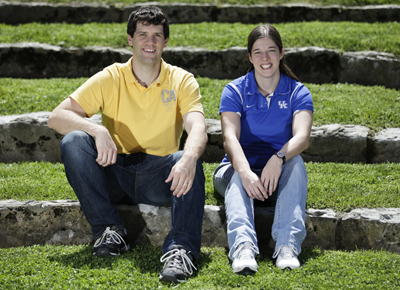Earth & environmental graduate students Ashley Barton and Donny Loughry took separate but similar paths to their graduate education at the University of Kentucky.
Both are natives of West Virginia. Both completed undergraduate degrees in education and have experience as teachers. Both had an interest in science and nature from a young age, and both relished the opportunity to be interviewed outside on a sunny day.
Most importantly, however, both Barton and Loughry decided that graduate study in UK’s Earth and Environmental Science (EES) Department was the right outlet for the their passion for science.
So what motivated them both to come to the University of Kentucky to continue their education as graduate students?
“When you’re teaching you have to come up with creative ways to get students to understand concepts, but you don’t get to do a lot of the scientific method, which is what science is all about,” Loughry said. “In schools today it seems like your subject takes a backseat because there are so many other factors you have to worry about when teaching a class,” Barton added.
Simply put, both of them just wanted to do science.
Barton, who started in UK’s graduate program in the fall of 2009 after graduating from Marshall University with degrees in geology and secondary education, met with Alan Fryar and felt that his hydrogeology research fit well with her interests in geology and biology. She was also excited at the prospect of being so close to the Kentucky Geological Survey (KGS).
“It really helped that I had read a lot of papers from the KGS,” Barton explained. “Having the KGS here on campus, I was kind of star-struck. There are such great papers that come out of there.”
Before he started in the EES program in the fall of 2008, Loughry had a similar experience as a prospective graduate student at UK when he met David Moecher. “He is doing a lot of exciting things in the Blue Ridge, using geochronology and geochemistry to understand Appalachian tectonics. I was really motivated to find out more about what he was doing,” Loughry said.
Loughry took a similar direction in the research for his master’s thesis, which he successfully defended in April of this year. His research involved finding out information about the origin of basement rocks – deep mountain roots that have become lifted up and exposed at the surface – that can be found throughout the Appalachian Mountains. Loughry says that these studies of the Appalachians can be used as models for understanding younger mountain ranges such as the Himalayas.
“If we can understand how [the exposure] process works, in as far as the conditions that exist during their formation and what has happened since their exhumation, we can get a good handle on collision rates,” Loughry said. “We can get an idea about plate tectonic activity in other parts of the world as well.” Now having finished his master’s, Loughry will take part in an internship at Pioneer National Resources in Dallas for the summer, and plans on returning to UK for his doctorate.
 Barton’s impending research in hydrogeology is focused on a local rather than a continental scale. Beginning this summer, Barton will examine karst aquifers – layers of soluble bedrock such as limestone – to map how pathogens move through the water supply. “We can see how contaminants are transported, so our goal is to figure out where the contaminants are coming from and stop them before they enter drinking water.”
Barton’s impending research in hydrogeology is focused on a local rather than a continental scale. Beginning this summer, Barton will examine karst aquifers – layers of soluble bedrock such as limestone – to map how pathogens move through the water supply. “We can see how contaminants are transported, so our goal is to figure out where the contaminants are coming from and stop them before they enter drinking water.”
Past research in this area has used fluorescent dyes or tiny beads called microspheres to trace water movement, but Barton’s work will involve the use of E. coli bacteria. “The chemistry is different with those other methods, so we’re going to use E. coli as a closer proxy to see how the bacteria themselves really move through the system,” she explained.
Both Barton and Loughry acknowledge early interest and experience in science as the motivating factors for their continued education and research. Barton recalls joining her mother – a science teacher – on a summer science camp trip and being fascinated by hydrology tests that determined the water quality of streams. “I can’t go walking through the woods because if I see a creek I’m down in it, trying to determine the health of the stream.”
Although tectonics are not as accessible in the same way, Loughry grew up in the Appalachians and was always interested in the rocks he found there, and began to raise questions about the origins of those rocks. “It fascinates me to think about the fact that mountain ranges are really ancient continental collisions that you can study,” Loughry said.
Barton and Loughry feel that their experiences at UK have inspired them to learn more and really made their time here special. They credit their advisors with offering a positive support structure while giving them space to learn on their own, and value the lessons about scientific processes and methods of analysis they have learned in the lab.
Each of them looks forward to the discoveries of research and careers in the sciences in the future, but for now they both just enjoy the continued opportunity to do science.
by Guy Spriggs
